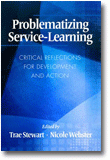
Problematizing Service-Learning
Critical Reflections for Development and Action
Edited by:
Trae Stewart, University of Central Florida
Nicole Webster, Pennsylvania State University
Published 2010
Interest in and research on civic engagement and service-learning have increased exponentially. In this rapid growth, efforts have been made to institutionalize pedagogies of engagement across both K-12 and higher education. As a result, increased positive attention has been complemented equally by well-founded critiques complicating experiential approaches’ claims and questioning if institutional, financial, and philosophical commitment is warranted. A key complaint from these critical voices is the tightly woven, protective insular core in the field of service-learning. This claim is not unfounded, nor necessarily bad. Initial efforts to legitimize service-learning and other forms of community-based education required group cohesion. The concern, however, is that the initial group cohesion has led to groupthink wherein group members have avoided critical analysis and evaluation. This book aims to prevent groupthink within the field of service-learning by allowing for the examination of effective alternatives by new voices who can serve as “critical evaluators” from within the field itself.
Myriad perspectives are offered, including empirical, theoretical, practical, and community perspectives. Authors challenge preconceived notions of service-learning, who is benefited by this pedagogy, outcomes of participation and implementation, and most importantly the theoretical, conceptual, and methodological lenses through which service-learning is even considered. The book allows servicelearning’s major criticisms to be examined, challenges to be voiced, and research agendas to be laid.
This book parallels service-learning’s presence and popularity across various disciplines/fields. Chapters are written from broad perspectives and are aimed to inform service-learning researchers and educators, community organizations, and policy makers who consider service-learning as a means to address civic responsibility. Authors expose theoretical and philosophical concerns circulating in the field, and often still occupying spaces on the fringe of discourse, action, and research. The book raises fundamental questions for undergraduate and graduate courses with social justice themes by considering the implications that pedagogies of engagement have on learners and communities.
CONTENTS
Foreword, Andrew Furco. Preface: Why Problematize Service-Learning and Why Now? Trae Stewart and Nicole Webster. PART I: EXPANDING FRAMEWORKS. Creating Spaces for Service-Learning Research: Implications for Emergent Action and Civic Ingenuity, M. Jayne Fleener, Laura Jewett, Jolanta Smolen, and Russell L. Carson. Service-Learning as an Intellectual Movement: The Need for an "Academic Home" and Critique for the Community Engagement Movement, Dan W. Butin. Opening Up Service-learning Reflection By Turning Inward: Developing Mindful Learners Through Contemplation, Trae Stewart. PART I I: COMPLEXITIES IN SITUATING SERVICE-LEARNING. Virtual Adoption of Service-Learning Through Controlled Discourse, Sharon M. Livingston. Service-Learning: An Exportable Pedagogy? Margaret Brabant. Collegiate Service-Learning: Perspectives on Legal Liability, Martin Dupuis, Melody A. Bowdon, and Sarah Schwemin. PART I I I: YOUTH DEVELOPMENT, VOICES, AND PERSPECTIVES. Youth Development in Traditional and Transformational Service-Learning Programs, Matthew A. Diemer, Adam M. Voight, and Cyndi Mark. Who's in Charge?: Examining the Complex Nature of Student Voice in Service-Learning Projects, Shira Eve Epstein. Service-Learning: A Student's Perspective and Review, Angela Perkey. PART IV: OTHERNESS AND INCLUSIVENESS. Service-Learning and the Culture of Ableism, Pamela J. Gent. A Critical Connection Between Service-Learning and Urban Communities: Using Critical Pedagogy to Frame the Context, Nicole Webster and Heather Coffey. Discourse of Advocacy: Student Learners' Critical Reflections on Working with Spanish-Speaking Immigrant Students, Chiu-Hui (Vivian) Wu and Robert L. Dahlgren. Service Loitering : White Pre-Service Teachers Preparing for Diversity in an Underserved Community, Valerie Hill-Jackson and Chance W. Lewis. PART V: CHALLENGES AND CONCLUDING REMARKS. Reflections on Scholarship and Engaged Scholarship: A Call to the Field, Robin J. Crews. Service-Learning Research: Returning to the Moral Questions, Peter Levine. About the Editors. About the Contributing Authors.
REVIEWS
"I have been waiting for a book like this. In Problematizing Serving-Learning, Stewart and Webster have assembled a provocative collection of analyses that trouble the very foundations and practices of service learning, and offer insights and innovations for service learning that advances anti-oppressive goals. Anyone interested in engaged teaching should read this book." Kevin Kumashiro Author of "The Seduction of Common Sense"
"Dissatisfied with the ambiguity of service learning's theoretical inconsistency and unsupported claims of accomplishment, yet committed to the potential to engage students in deep learning that also contributes to communities beyond the academy, Trae Stewart and Nicole Webster have gathered a perceptive cohort to explore service learning through fresh eyes. The result is a respectful call to teachers, students, student affairs professionals, and community members to challenge, question, and reframe their service learning work. In questioning some of service learning's basic assumptions, the authors invite a new and deeper appreciation of the field." Dr. Jeremy Cohen Penn State University
"This book is exactly what the field of service-learning needs. It represents a thoughtful critique of the notion that there is only one right way to design service-learning. The authors take you on a reflective journey that will encourage new thinking about scholarship and pedagogy, and will lead to improved practice around engaging communities of color." Wokie Weah National Youth Leadership Council (NYLC)
-
Paperback978-1-61735-209-6
Web price: $45.04 (Reg. 52.99)
-
Hardcover978-1-61735-210-2
Web price: $80.74 (Reg. 94.99)
- eBook9781617352119

-
 (Re)Envisioning Social Studies Education Research
Current Epistemological and Methodological Expansions, Deconstructions, and Creations
(Re)Envisioning Social Studies Education Research
Current Epistemological and Methodological Expansions, Deconstructions, and Creations
-
 American Educational History Journal - Golden Anniversary Edition
Volume 50 Numbers 1 & 2
American Educational History Journal - Golden Anniversary Edition
Volume 50 Numbers 1 & 2
-
 Distance Learning
Volume 20 #3
Distance Learning
Volume 20 #3
-
 Distance Learning
Volume 20 #4
Distance Learning
Volume 20 #4
-
 Faculty Development
Achieving Change Through Action Research
Faculty Development
Achieving Change Through Action Research
-
 Qualitative Research With Diverse and Underserved Communities
Qualitative Research With Diverse and Underserved Communities
-
 Quarterly Review of Distance Education
Volume 24 #1
Quarterly Review of Distance Education
Volume 24 #1

